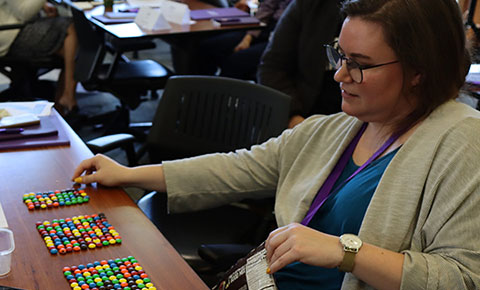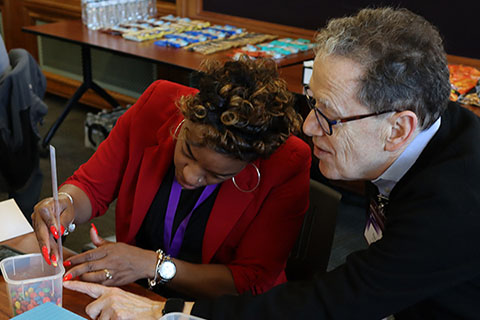E4 Center Brings Together Researchers and Educators

Educators, researchers, and curriculum providers gathered at Northwestern University’s School of Education and Social Policy (SESP) for a conference focused on K-12 mathematics instruction.
The first annual convening, held in the spring of 2023, was organized by the Center for Education Efficacy, Excellence, and Equity (E4), an innovative partnership that brings together Northwestern researchers, school districts, and the technology company Curriculum Associates to create information and resources that teachers can really use.
Miriam Sherin, the Alice Gabrielle Twight Professor of Learning Sciences and associate provost for undergraduate education, kicked off the E4 convening with an evening talk focused on the role of video in strengthening teacher noticing in the classroom. She explained that when teachers record their interactions in the classroom and discuss what they’re seeing with peers, they show more curiosity about their students’ thought processes in future interactions.
The next day, Jen Munson, assistant professor of learning sciences, led a lively interactive session titled “What is a Billion?” Participants worked in groups using a variety of tools to determine how many M&Ms could fit inside a classroom in Annenberg Hall. Teams arrived at similar answers using different methods, showing that there are multiple valid paths to math understanding.
“I can’t wait to do [the M&M activity] with teachers,” said Nikki Williams, principal of the Oakland (Calif.) Academy of Knowledge. “With math especially, there's usually right or wrong. But that experience just reminds teachers that the learning is in the process and not the answer.”
Participants also gave researchers feedback in a series of roundtable discussions. Together they looked at achievement patterns in de-identified data from i-Ready, a digital curriculum platform made by E4 partner Curriculum Associates. Educators told researchers firsthand what they found most useful and what other information would help them make decisions in their school districts.
Rounding out the day was a talk by Michael Lach, assistant superintendent of Township School District 113 in Highland Park, Ill., who shared how his perspectives on education have transformed over the course of his career as a teacher-turned-administrator.
Lach emphasized the interplay of district- and classroom-level factors: how supportive policies and structures and devoted teachers are equally critical to educational improvement.
 E4 Director Paul Goren (left) then led a synthesis and share-out of the group’s ideas and suggestions for future learning opportunities and research directions. Many of the suggested research questions centered on best practices in education, such as “What practices are differentiating schools that are seeing accelerated post-pandemic learning?”
E4 Director Paul Goren (left) then led a synthesis and share-out of the group’s ideas and suggestions for future learning opportunities and research directions. Many of the suggested research questions centered on best practices in education, such as “What practices are differentiating schools that are seeing accelerated post-pandemic learning?”
In addition to the structured sessions, participants said they appreciated the chance to connect informally over meals and breaks–especially after months of collaborating over Zoom.
“There's nothing like human connection for learning, and there's nothing like human connection for overall thriving,” said Peter Leonard, director of assessment for Chicago Public Schools. “Bringing people together is a great chance to continue to build the relationships that will help grow this partnership and help move it to the next stage in its evolution.”